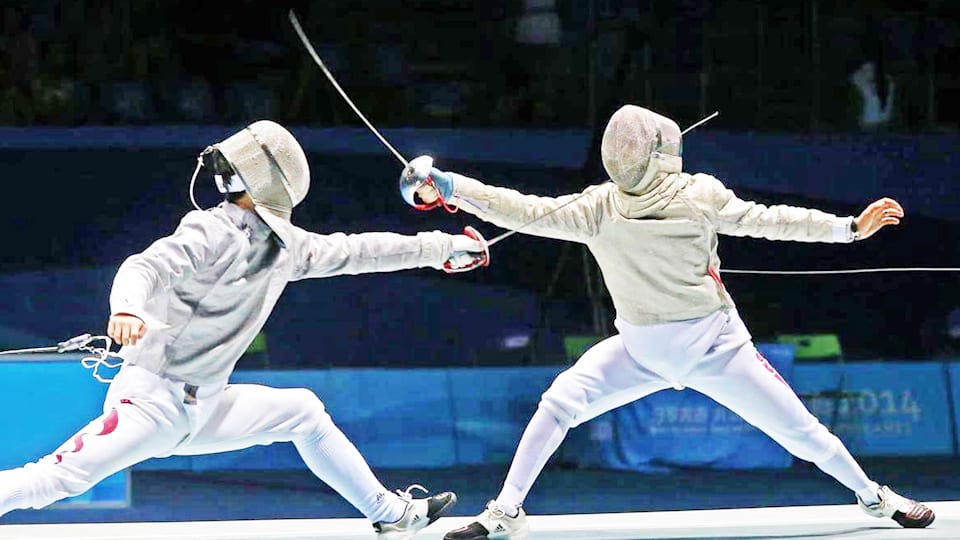
The YOG provide so many positive experiences that help set young athletes up for their future sporting careers – from cultural exchange with athletes from other countries and sports in the Youth Olympic Village, to the opportunity to glean inspirational nuggets of advice from the Athlete Role Models who have walked in their shoes.
But as an elite sporting event where the standard of competition seems to get higher with each edition, the YOG can dish out some tough lessons too.
Take Tunisian fencer Fares Ferjani, for example. Aged 17, he finished just off the podium in fourth in the men’s sabre competition at the YOG Nanjing 2014, despite taking a commanding lead in his semi-final bout where closing out the win would have guaranteed a gold or silver medal.
Here, Ferjani describes how the lessons he learned in Nanjing – as well as some encouraging words from a champion – have stayed with him during his climb up to number 15 in the senior world rankings in the six years since, as he targets a medal at the Olympic Games Tokyo 2020.
What do you remember about your experiences at the YOG Nanjing 2014?
“It was a very good and a very bad experience! At first, my goal was just to win my first bout, and I was very happy after I did that – and then I won my second bout and found myself in the semi-finals. I was winning that match 8-2 or 8-3 against a Russian fencer [eventual gold medallist Ivan Ilin], and at some point I started thinking in my mind that I could win the whole tournament. But then I cracked. Instead of enjoying my fencing I just wanted to finish the bout, and from 8-2 or 8-3 up I lost 15-10 or 15-11. It was very disappointing.
“I then lost to a good friend of mine [China’s Yan Yinghui] in the bronze medal bout, and seeing all of them getting medals and not me was very, very hard. Even if I found out that I have some talent in fencing, I learned that I wasn't professional enough to win a medal because I wasn't ready mentally. It was a long time ago now, but I am still hurt from it.”
Do you have more positive memories from the Youth Olympic Village or away from the field of play?
“Yes, I met a lot of amazing people and made some friends that I'm still speaking with to this day. And I remember being invited to a breakfast with some other YOG athletes and IOC President Thomas Bach, when he told me something very nice. He said: ‘You have talent, and I think you have a nice future.’ That was interesting for me, to have an Olympic champion in fencing like him telling me that I have a good future, and I was very happy about it. I think any small words from any big champion can help a young athlete. If you say one or two nice words to them, it can change their lives.”
How proud were you to represent Tunisia on the international stage?
“It made me very happy, because I love my country more than any other country in the world. My country has so many heroes and amazing athletes, politicians and writers, and I’m proud to be Tunisian and to have that big history behind me. Seeing the flag at the [Nanjing 2014] Opening Ceremony made me very enthusiastic for the future.”
You were still only 19 when you made your Olympic debut two years later in Rio. How was that experience for you?
“The 2016 Olympic Games were very fun for me. I fenced against a role model of mine, [Italy’s four-time Olympic medallist] Aldo Montano, and I was very proud of myself that I showed some qualities. I was young and I really didn't know what I was doing, to be honest. I had no great technique and I was just enjoying myself. I was very happy with 2016 and I hope 2021 will be more serious.”
How did you feel when Tokyo 2020 was postponed?
“I was disappointed at first. But my coach, Yury Gelman, is very smart, and he told me: ‘You don’t have to be disappointed.’ He said that one year is good for me to reach the level of some of the fencers who are above me in the rankings. And when I thought about it, it was actually true. I started seeing the positive side of it, and it actually made me more confident that I could have a better chance to do something at the Olympic Games than if it had happened last month.
“Next year in Tokyo, I'll be 24. My dream, as it is for all fencers, is to win a medal at the Olympic Games. I'm dreaming about that every single day, and even if it doesn't work next year, I will try again in 2024.”
How will you prepare yourself for the Olympic Games in 2021?
“I’ll continue to be based at St John’s University [in New York, USA], where I’m studying finance, and I’m going to try and keep my life the same: training twice a day, six days per week. I’m just going to try and keep things healthy, continue with my mental training and meditation, and try to learn more and more about myself. And the most important thing: I’m just going to enjoy the ride.”
